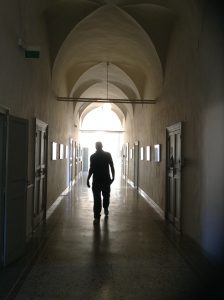By: Hsiao-Hung Pai*
Modou was shaking with anger when he called me. “Where is humanity?” he said. He was 17, from Gambia, and has been living in a camp in southern Sicily for nearly two years. He was crying for a fellow migrant, Alagiee Bobb, a 19-year-old, also from Gambia, although they’d never met. Alagiee was shot by Carmine Della Gratta, the 43-year-old manager of his camp in Gricignano d’Aversa in Casertano, 15km north of Naples.
The camp hosted 159 asylum seekers back in November and was known to be poorly equipped. There was not even heating in the winter. Alagiee was among those protesting against the living conditions for several days before the shooting, which happened during a confrontation that escalated. “He was shot in the mouth twice,” Modou said, desperately upset.
Although the manager had been arrested for attempted murder, and four migrants had since then run away from the camp, fearing that their lives were in danger, there was barely any news in the mainstream press about the shooting. Modou only heard from a friend that Alagiee had been hospitalised in Naples. The Italian local news emerged in December that Alagiee was discharged from hospital, although he still had a bullet stuck in his throat and could barely swallow fluids. According to doctors at the hospital, “it would be more dangerous for him to remove the bullet than to leave it there.”
Migrants protested in the street showing solidarity for Alagiee. Only after intervention by the police, migrants removed barricades made with rubbish and returned to the camp. But apart from the response from migrants in camps, the outside world didn’t seem to know or care. Imagine a white man being shot by the person responsible for his care not making news headlines.
I’ve found the silence deafening. It makes me think about the European perspective towards “outsiders”, i.e., people who flee wars, conflict, poverty and destruction which are consequences of imperialism and the unequal world in which we live.
Throughout my journey when researching my book Bordered Lives, I have seen, time and time again, the European apathy that stems from a hierarchy of thought where lives are valued differently according to ethnicity and where the suffering of some is seen as very much less worthy of attention.
In the middle-class liberal circles, the “refugee crisis” continues to be the media term by which everyone thinks about displaced people in the world. What underlines the mainstream “refugee crisis” narrative is the White Saviour assumption of “us” and “them”, the displaced people being the “problem” for “us in Europe” to find solutions.
This hierarchy in which lives are valued is a colonial legacy that sees the formerly colonised as the less worthy human beings, who are considered to be less deserving of a decent life. Thus, while white Europeans who migrate and live abroad are described as “expats”, those from the Global South are anything but. To keep out the unwanted, Europe establishes the distinction between “those who flee wars” and “those who want a better life”, i.e. the false distinction between refugees (“the passive, apolitical victims who are forced to move”) and “economic migrants” (who are “able to choose to move”). Both are, in the European policy mindset, alien others. The idea that people’s circumstances can either be categorised politically or economically renders them not quite like “us” (= not quite human). These are precisely the “racial assemblages” phrased by Alexander Wehelyie, a U.S. professor of African American Studies, in which humanity is disciplined and stratified into “humans, not-quite-humans, and non-humans”.
At dinner parties among liberal circles, you may hear expression of such sentiment that somehow certain people’s suffering is not sufficiently terrible to warrant demands of their rights and protection of their wellbeing. When discussing living conditions in reception camps in Europe, I’ve had white liberal friends say to me, “But that’s not really that bad,” “Well, at least they’re not living in a tent,” “But at least they’re fed.” Well, why not try to think whether you or your children could live in those conditions?
If the answer is no, then perhaps the problem is this European attitude that sees some as the undeserving Third World poor, whose suffering is seen as self-inflicted. This approach lies at the centre of Europe’s asylum and immigration policy-making and public discourse. The under-17-year-olds who were trafficked into Libya for labour exploitation and eventually escaped on a boat to Europe; The Gambian and Eritrean boys and girls who have been waiting endlessly for decisions on their future and are wasting away their adolescent years inside the reception shelters of Sicily and all over Italy; The Afghan and Iraqi youths who sleep in the streets of Paris because this capital city of one of the wealthiest countries on earth couldn’t cope with them; the Kurdish boy, and many others before and after him, who died in their attempt to cross the Channel to Britain. Where are they on your humanity ladder?
The sources for this article are based on the author’s fieldwork for her book, Bordered Lives: How Europe Fails Refugees and Migrants, published on 18 January by New Internationalist.
Author Bio:
Hsiao-Hung Pai is a journalist and author of Chinese Whispers: The True Story Behind Britain’s Hidden Army of Labour (2008), shortlisted for the Orwell Book Prize 2009; Scattered Sand: The Story of China’s Rural Migrants (2012), winner of the Bread and Roses Award 2013; Invisible (2013), Angry White People (2016) and Bordered Lives: How Europe Fails Refugees and Migrants (2018).

